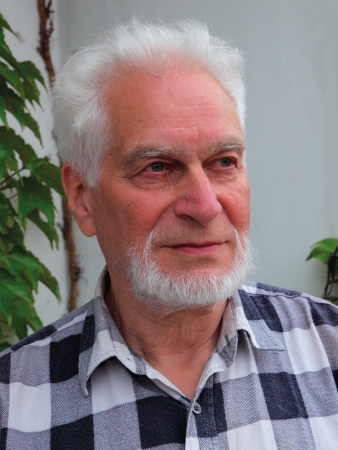
Worse than the Apocalypse…
Toman Brod was born on 18th January 1929 in Prague into the family of a grain wholesaler. His dad, Arnošt, came from Bučice, while his mum Olga, née Picková, was born in Ledeč nad Sázavou.
The Brods lived in Prague in a flat on Palackého nábřeží and brought up their two sons, Toman and his elder brother Hanuš. They had a cook, Anna Kopská, who had worked for Toman’s grandfather and then his parents, and eventually, after the war, became part of his family. This lady would play an important role in the life of the family.
His peaceful childhood did not last long. There came Munich, the occupation, the anti-Jewish sentiments and regulations. In September 1941 he fastened a yellow six-pointed star onto his jacket and realised for the fi rst time that he had become a “second-class citizen”. In July 1942 he, his mother and his brother were assigned to be transported from Prague to Terezín–Bohušovice (27th June 1942). “As there was still no train to Terezín, me, my mum and my brother had to walk there, weighed down with heavy baggage which they later confi scated anyway, leaving us unprepared for life in the ghetto. I think my mum lived in the Hamburg Barracks and me and my brother in the Hannover Barracks, which we soon left, as we moved to the children’s home in building L 417, in the former school gym, which was used as a temporary home for boys who had just arrived. I fell ill with scarlet fever there and ended up in the hospital. When I returned to L 417 I became part of the group of boys under the schoolmaster Arno Ehrlich. We were convinced that nothing could separate us. But most of my friends died, and although I’ve forgotten some names, I can see all their faces to this day.
My mum bore up to life in the ghetto bravely and although she never worked, after arriving in Terezín she prepared herself for the role of a woman who would have to work hard. On the square there was a home for over-mature and mentally-handicapped children, where she was in charge of one group of children. It was with great courage that she bore the hunger and misery of life in Terezín. From the package our former cook sent us from home she made gruel and soups, for me and my brother rather than for herself, even though she herself was hungry too.
Although Terezín seemed like a bad dream to me, it was going to get worse. My mum, my brother and I were assigned to be transported at the end of 1943, in December. On the ramp they gave us bread and salami, and perhaps a pot of tea, all for a hundred people. With a curse, they handed us a bucket to use as a toilet. Half of the wagon was taken up by luggage; there was no ventilation and no window. We travelled for a long time, perhaps two days and a night. Every so often we stopped somewhere; it was impossible to breathe, the bucket leaked, we were fi lthy, and there were already dead bodies in our wagon. We had arrived in Auschwitz.”
Toman lived through the hell of Auschwitz– Birkenau, the Gross-Rosen concentration camp in Kladsko and eventually ended up in a camp in some kind of former factory, which the SS left on the evening of 8th May, and Toman was free. He weighed 40 kg, was skin and bone, and in the hospital had suff ered enteric fever and typhoid. He walked most of the way back, also catching a ride on a coal wagon and eventually an express train home, to Prague. He staggered out of the station (he was soon to go down with tuberculosis, too) to Masná Street, which he, his mum and his brother had left practically three years before when they were put on the transport. He was reunited with Mrs. Kopská, who became his guardian, as the Nazis had murdered virtually all his family – his mum, his brother, his uncle Jindřich and his wife, his aunts Hermína and Štefa, and Jindřich, his aunt Růženka’s husband. It wasn’t until 1947 that he began to lead a normal life again, but the family property had dwindled away. The grammar school wouldn’t take him because of his age, so he did a year’s course at the Maděrová Business School. He started his fi rst job at the recommendation of his uncle Karel as a clerk in a gramophone factory. His first labouring job came in 1948, and was followed by studies at the University of Economic and Political Science. In 1955 he completed his History course at Charles University. At the end of the 1960s he found the strength to oppose the totalitarian regime, for which he was sacked from his job and thrown out of the party. He made a living pumping water and driving a taxi; he signed Charter 77, and lived on. In spring 1954 he managed to marry Libuše Kvasničková and in the same year they had a daughter, Šárka. Nowadays he is considered one of the country’s most prominent and renowned historians. In 2007 he published a book of memoirs, aptly named “We Can’t Know What To Expect In Life”.
Luděk Sládek, source: Toman Brod
Nesouhlas se zpracováním Vašich osobních údajů byl zaznamenán.
Váš záznam bude z databáze Vydavatelstvím KAM po Česku s.r.o. vymazán neprodleně, nejpozději však v zákonné lhůtě.